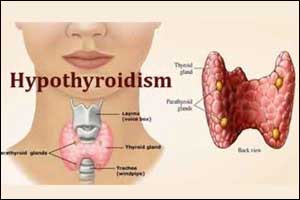- Home
- Editorial
- News
- Practice Guidelines
- Anesthesiology Guidelines
- Cancer Guidelines
- Cardiac Sciences Guidelines
- Critical Care Guidelines
- Dentistry Guidelines
- Dermatology Guidelines
- Diabetes and Endo Guidelines
- Diagnostics Guidelines
- ENT Guidelines
- Featured Practice Guidelines
- Gastroenterology Guidelines
- Geriatrics Guidelines
- Medicine Guidelines
- Nephrology Guidelines
- Neurosciences Guidelines
- Obs and Gynae Guidelines
- Ophthalmology Guidelines
- Orthopaedics Guidelines
- Paediatrics Guidelines
- Psychiatry Guidelines
- Pulmonology Guidelines
- Radiology Guidelines
- Surgery Guidelines
- Urology Guidelines
Levothyroxine Dose Adjustment in Pregnant Women With Primary Hypothyroidism

The maternal thyroid hormones have to be strictly regulated during pregnancy for optimal maternal and fetal outcomes.Although there are no specific guidelines addressing maternal levothyroxine (LT4) dose adjustments throughout pregnancy close monitoring of maternal thyroid function is recommended in hypothyroid women during pregnancy.
The American Thyroid Association (ATA) recommends that maternal thyroid-stimulating hormone (TSH) be maintained between 0.1 and 2.5 mIU/L in trimester 1 (T-1), 0.2 and 3.0 mIU/L in trimester 2 (T-2), and 0.3 and 3.0 mIU/L in trimester 3 (T-3) to prevent potential adverse outcomes related to maternal and fetal hypothyroidism. Dr.Shannon D. Sullivan and associates in Academic endocrinology clinics in Washington, DC compared two LT4 dose-adjustment algorithms in hypothyroid pregnant women and found that an ongoing adjustment approach is as effective as empiric dose increase for maintaining goal TSH in hypothyroid women during pregnancy.The study was published in Journal of Clinical Endocrinology and Metabolism.
The researchers compared 2 methods for adjusting thyroid medicine during pregnancy in women with known thyroid disease. Pregnant women (age 18 to 45) who take thyroid medication were randomized to either 1) a 2-dose per week increase in thyroid medicine once pregnancy is confirmed, followed by dose adjustments every 2-4 weeks, or 2) adjustments in thyroid medication every 2-4 weeks in micrograms per day based on results of blood tests. The investigators compared thyroid hormone levels throughout pregnancy between the groups of mothers to determine which method is superior in meeting the increased thyroid hormone requirements during pregnancy.
.It was found that seventy-five percent of TSH values were within trimester-specific goal ranges in G1 compared with 81% in G2 (P = 0.09). Similar numbers of LT4 dose adjustments per pregnancy were required in both groups (G1, 3.1 ± 2.0 vs G2, 4.1±3.2; P = 0.27). Women in G1 were more likely to have suppressed TSH<0.1 mIU/L in trimester 1 (P = 0.01). Etiology of hypothyroidism, but not thyroid antibody status, was associated with proportion of goal TSH values.
The authors compared two options for LT4 dose adjustment and showed that an ongoing adjustment approach is as effective as empiric dose increase for maintaining goal TSH in hypothyroid women during pregnancy
For further reference log on to :
J Clin Endocrinol Metab. 2017;102(9):3499-3507. © 2017 Endocrine Society

Disclaimer: This site is primarily intended for healthcare professionals. Any content/information on this website does not replace the advice of medical and/or health professionals and should not be construed as medical/diagnostic advice/endorsement or prescription. Use of this site is subject to our terms of use, privacy policy, advertisement policy. © 2020 Minerva Medical Treatment Pvt Ltd